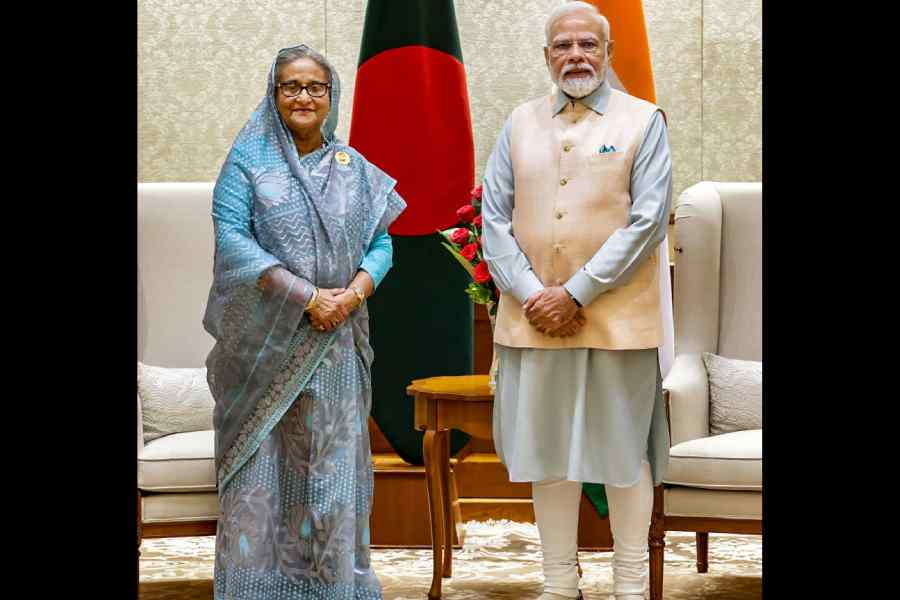Old bonds
Whenever Sheikh Hasina Wazed came to London, I would make it a point to see her because I have covered Bangladesh from the start. “Come and see me in Dhaka,” she said when I interviewed her at the Bangladesh High Commission for the Daily Telegraph. The army officers who had killed Sheikh Mujibur Rahman and his extended family had been particularly brutal, not sparing anyone. Wazed expressed her determination to bring her father’s assassins to justice. She was not in government when I arrived in Dhaka; she took me to her old family home, which has since been a kind of martyr’s museum to her father. It was a dimly-lit place looked after by a few servants. Wazed identified the spot where her father’s body had been riddled with bullets. She said she would not repair the holes in the wall where the bullets had struck. I remember the night was peaceful with little to indicate it had been the scene of a massacre. That is why I think the youths who pulled down Bangabandhu’s statue are ignorant of the history of their own country.
There is a post-script to the tale. When I was covering South Asia for the Sunday Times, two young sisters dropped in to see me. They wanted to complain about the Awami League. It turned out that they were the daughters of one of the principal coup plotters. He had been rewarded with a diplomatic job so his daughters had grown up abroad with an anti-Mujib version of events. In the end, it didn’t seem fair to visit the sins of the father on his daughters.
Erudite man
K Natwar Singh, who died aged 93, is known in India as someone who became bitter after having to resign as India’s external affairs minister from Manmohan Singh’s government when his name cropped up in a United Nations report as an alleged beneficiary of illegal pay-offs in the Iraqi oil scam. But I knew a different, more erudite man. He served as the Deputy Indian High Commissioner in London from 1973-77. The man I knew loved books. He spent some time in Cambridge where he met EM Forster and developed an expertise in his novels, including A Passage to India.
During dinner one evening at Singh’s home in Delhi — he had an extensive library — he spoke of his desire to review books for the Financial Times. In 2005, he launched Vikas Swarup’s debut novel, Q&A, which was made into the film, Slumdog Millionaire. Natwar joked that talented officers in his ministry loved writing novels much more than their daily work.
I also learnt from Marina and Shirin Wheeler that their mother, Dip (short for Kuldip) Singh, a great beauty in her youth, was painted by MF Husain. They were desperate to see the portrait. That painting did indeed hang in Singh’s home in Delhi.
Mammoth task
Campbell Wilson, the CEO and managing director of Air India, has been in London, talking of returning the airline to its glory days. What’s missing are direct flights at affordable prices between Calcutta and London which British Airways once had. Such a service would help to bring prosperity to West Bengal. In 2017, the UK had 5,62,000 visitors from India. There is potential for more people in Calcutta to holiday in London, catch a play and savour some chicken tikka masala.
Wilson showed off the Airbus A350, “the most modern aircraft in the world”, at the Farnborough International Airshow. He also highlighted “the aircraft order we made, the largest in history, of 470 aircraft, with a list price of about $70 billion”. Air India is featuring ads across train panels, black taxis and digital screens in London offices and shopping centres. Wilson told me he is doubling capacity from Mumbai and Delhi into Heathrow, and adding flights “from Bangalore to London, and from Kochi, Goa, Ahmedabad and Amritsar into Gatwick”.
Wilson said The Economist had described what he was trying to achieve as “the Everest of corporate turnarounds”. The Daily Telegraph, which gave Wilson a lot of space, said “he reasoned that, in Sir Edmund Hillary, the world’s highest peak had been conquered by one of his countrymen.” Wilson told the paper: “I’m a New Zealander. It’s in my DNA.”
Tough questions
The Israeli government’s spokesman, David Mencer, behaved outrageously when questioned about civilian casualties in Gaza by the BBC presenter, Mishal Husain, on Radio 4. When she pressed him to answer her question, he said she had won the “pro-Palestinian reporter of the year award” and accused her of “blindly repeating what terrorist organisations… feed you”. Luckily for the Pakistani-origin Husain, BBC bosses defended her: “As the listener could hear, Mishal Husain was asking legitimate and important questions in a professional, fair and courteous manner.” At LBC, the Indian-origin presenter, Sangita Myska, was not so lucky. She was sacked after she refused to bowl dollies to the Israeli government’s spokesman, Avi Hyman.











